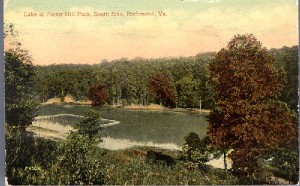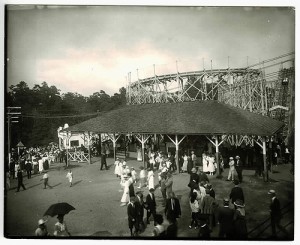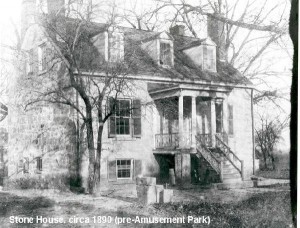Forest Hill History
About section: Main | History of Forest Hill | Minutes of past meetings
Much of our neighborhood’s history revolves around Forest Hill Park. Below is a brief history of Forest Hill Park. (All of the photos on this page are courtesy of the Valentine Richmond History Center.)
 Holden Rhodes (born Canada, 1798-99, died Richmond, 1857) built his country estate, “Boscobel,” on a bluff above the south bank of the James River around 1836-1843. The house is constructed of granite quarried on the property, which included some 140 acres. Rhodes had come to Richmond to serve as a tutor for the children of a prominent Richmond attorney, and later himself became an attorney, an industrial entrepreneur, and first president of Richmond & Petersburg Railroad Company. In 1889, the Rhodes estate was sold to the Virginia Passenger & Power Co., and became a terminus for the Forest Hill Trolley (no. 222). Power for the trolley came from a water-turbine generating plant on Belle Isle.
Holden Rhodes (born Canada, 1798-99, died Richmond, 1857) built his country estate, “Boscobel,” on a bluff above the south bank of the James River around 1836-1843. The house is constructed of granite quarried on the property, which included some 140 acres. Rhodes had come to Richmond to serve as a tutor for the children of a prominent Richmond attorney, and later himself became an attorney, an industrial entrepreneur, and first president of Richmond & Petersburg Railroad Company. In 1889, the Rhodes estate was sold to the Virginia Passenger & Power Co., and became a terminus for the Forest Hill Trolley (no. 222). Power for the trolley came from a water-turbine generating plant on Belle Isle.
 To attract customers to the countryside, the company built an elaborate turn-of-the-century amusement park on the grounds, complete with carousel, loop-the-loop, bath house, swimming area, fun house, and other amenities. The park remained a popular Richmond attraction until 1932.
To attract customers to the countryside, the company built an elaborate turn-of-the-century amusement park on the grounds, complete with carousel, loop-the-loop, bath house, swimming area, fun house, and other amenities. The park remained a popular Richmond attraction until 1932.
After the land was deeded to the City of Richmond in 1933, the rides and other amusements were demolished to convert the dilapidated estate into a finely landscaped park. During the Works Progress Administration in the era of the Great Depression, unemployed craftsmen and stonemasons working under the auspices of the National Relief Act applied their skills to pave the footpaths with cobblestones, adding a stone and slate Gazebo, a Warming Hut for use by winter ice-skaters on the pond, and new landscaping.
The new Forest Hill Park quickly became a quieter, more restful place for family picnics, strolling, hiking, and bird-watching. Today, as a result of unregulated development along Reedy Creek in the Midlothian corridor upstream, and consequent deposits of sediment in the pond, the park’s lower area has become a wetlands and wildlife refuge, attracting animals rarely found in city parks — bald eagle, river otter, and great blue heron, to name a few.
 With the reinvigoration of the area’s Neighborhood Associations, citizens have focused renewed attention on issues critical to the park’s future: whether or how much to dredge the lake, how to restore deeply eroded slopes and stream banks, improving visitor safety, building a tot lot, and ensuring the preservation of the Old Stone House and other historic man-made structures.
With the reinvigoration of the area’s Neighborhood Associations, citizens have focused renewed attention on issues critical to the park’s future: whether or how much to dredge the lake, how to restore deeply eroded slopes and stream banks, improving visitor safety, building a tot lot, and ensuring the preservation of the Old Stone House and other historic man-made structures.
This is a park with both a deep past and a bright future. Greenspaces such as Forest Hill Park add to the quality of life, add value to surrounding properties, and serve as a safe haven for both people and wildlife from the bustle of urban life. Guiding it into the next century, the Friends of Forest Hill Park have been working with their affiliate, the Forest Hill Neighborhood Association, their partner the Richmond Recreation and Parks Foundation, with other area neighborhood groups, and with the City of Richmond, to ensure that the park continues to serve the people of Richmond from all walks of life.
